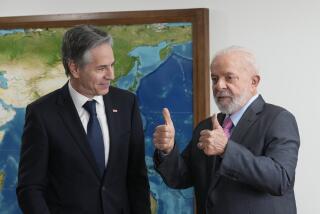Brazil to Lead Latin Group Seeking to Ease Debt
- Share via
RIO DE JANEIRO — Brazil, the Third World’s largest debtor nation, has decided to lead a regional Latin American negotiating group grappling with ways to obtain better terms from foreign creditors that will allow the region to maintain economic growth while paying $35 billion a year on its foreign debt.
Official sources here said that Brazil had decided, after a meeting between President Jose Sarney and his ministers of finance and foreign affairs, to propose to other major Latin American debtors, who will meet in Montevideo, Uruguay, on Monday, a debt strategy that combines increased exports, reduced foreign interest payments, and postponment of capital payments on the region’s $380-billion debt.
The sources said this should not be viewed by creditors as the long-feared emergence of a “debtors’ cartel” that would declare a collective moratorium on debt payments, as has been proposed by President Fidel Castro of Cuba, whose debts are owed to the Soviet Union and not Western banks.
The meeting in Montevideo comes 18 months after the creation in Cartagena, Colombia, of the Latin American debtor group of 11 nations. They have been calling on the United States, Western Europe and Japan for a “political negotiation” on the debt.
For the Latin Americans, a political negotiation means that debt payments must be linked to a reduction in U.S. interest rates, easier access of debtor nations’ goods to the markets of the industrial countries and new flows of development capital to the debtors.
Interest rates, trade policy and development lending through institutions such as the World Bank are not matters that can be determined by private banks, which hold 70% of the Latin American debt. The Latin American debtors are insisting that the governments of creditor countries must become directly involved in solving the debt problem.
Latin Dissatisfaction
So far, the only U.S. response has been the so-called Baker plan announced by Treasury Secretary James A. Baker III in September, which offers some of the leading debtors the prospect of $29 billion in new credits from private banks and multilateral development banks over the next three years if they open their markets to exports and private investments from the industrial countries.
The answer from the Latin Americans has been that the amount proposed is insufficient, the conditions are unacceptable and the scope of the proposal is inadequate, since it has no link between U.S. interest rates and debt payments.
Argentina, which adopted a strong austerity policy in July to fight inflation, is considered the prime testing ground for the Baker plan.
The annual interest payments on Latin America’s foreign debt are costing the region over $35 billion while new loans have dried up.
A 2% drop in interest payments would save the Latin American debtors $10 billion a year. Interest payments are double what they were when most of the present debt was contracted in the 1970s.
The other key issue for the debtors is trade. A steady decline in commodity prices since 1982 has driven down the export income of most Latin American countries to levels that require severe cutbacks in imports.
This has permitted the major countries to meet their debt payments, but imports are necessary to sustain economic development. Without growing economies, the Latin American debtors say they will be unable to keep up debt payments.
The Montevideo meeting, which wil involve the foreign ministers and finance ministers of 11 Latin American countries, including Brazil, Mexico and Argentina, is expected to come up with a regional position on the Baker proposal.
More to Read
Sign up for Essential California
The most important California stories and recommendations in your inbox every morning.
You may occasionally receive promotional content from the Los Angeles Times.













